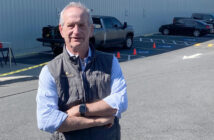
By A.J. Kaufman
Returning to civilian life after a military career, no matter the length or rank achieved, can be arduous. An informal but innovative group of officers from different branches have assembled in the Tri-Cities to help make this transition less daunting.
The leadership experience from the men and women — several retired colonels and a brigadier general among them — run the gamut. Realizing that there are roughly 200,000 veterans transitioning off bases annually, they volunteered for this new mission.
During a recent discussion at the Kingsport Chamber of Commerce, they shared their plans about how to support veterans and how they hope to coordinate their combined expertise.
“Veterans bring a lot to society, and there are so many out there, and we keep meeting new ones,” retired U.S. Army Col. Rob Campbell, who runs the Tri-Cities Chapter of the Veterans Business Collective, a group dedicated to increasing business opportunities for military veterans, mused. “Wouldn’t it be cool if we all got them together and leveraged the strengths that we have?”

He also said veterans need society and claims that he’s learned more in post-military life, especially on private business matters, from those who haven’t served, than any veteran could teach him. Campbell, who retired in 2016, picked Northeast Tennessee two years ago for his new line of patriotic work, because he found plentiful networking opportunities.
Retired Army Col. Dan Bishop became Director of Veterans Affairs at ETSU in early 2022. ETSU counts nearly 1,000 veterans on campus, when factoring in veterans, ROTC cadets, faculty and military families. He says the community resources are endless.
“This is one of the most patriotic places in the country,” he explained, then noted the need to incorporate younger veterans into organizations akin to the American Legion and VFW. “We have these cylinders of excellence, but there’s very little collaboration and cooperation. This core group, our nascent network, is trying to break down walls and increase the level of cooperation.”
There are more local organizations involved, too.
Brunnie Garcia is vice president for development at the Leadership Transition Institute (LTI). She relayed that her CEO, Annie Brock, transitioned in the late 1980s when there was no program for outgoing military. LTI’s program — Changing Focus Moving From We to Me — was created to help fill in the gaps of Department of Defense programs when getting back to the civilian sector.
“The military does a really good job of instilling you into the military, but when it’s time for you to either separate or retire, they don’t really do a good job to help us re-adjust into the civilian life,” the retired colonel with over three decades of military experience said. “We help them figure out what they want to do when they come out of the military, because most are going to spend more time in the civilian sector than they spent in the military. So, we need to have a clear purpose and vision.”

With nearly two in three former service members reportedly leaving their first job after they separate from the military within a year, the overarching hope of places like LTI is to minimize that percentage and foster a sense of purpose for veterans.
Retired U.S. Marine Corps Col. Wayne Bodine has held various civilian jobs, recently transitioned out of active-duty military, and thus has personal insight into these matters. He believes that each member has a strength and community is important. At the gathering, Bodine’s advice was to embrace veterans as they depart and transition into their second career.
“The military does a good job of administratively separating people, but where they struggle, and in part why we exist, they fail to help them discover who they are,” Campbell added. “There’s no magic formula to what makes us mechanics, engineers, pilots, infantryman…But that job passion misalignment is trumped by being part of a band of brothers and sisters, but when you get out it’s exacerbated.”
He notes that 80 or 90% of former service members pick a discipline in school different from what they did in the military, which is an example of the aforementioned mismatch.
Mitchell Richardson reiterated the common theme of taking care of veterans and their families.
“We want to synchronize the efforts of the existing organizations and better-known businesses that are out there,” the U.S. Air Force general with 32 years in the military explained. “I see us kind of like an operations center construct, where we run a checklist, if someone is moving to the local area, we…point them in the right direction.”
Miles Burdine, president and CEO of the Kingsport Chamber of Commerce, and a retired U.S. Marine Corps colonel with 30 years military background, also helped spearhead the partnership and attended the Oct. 24 roundtable.
There are nearly a half-million veterans in Tennessee, approximately 9% of the state’s population. Within our seven-county region, nearly 40,000 reside, the highest percentage of veterans in the Volunteer State. The thriving region also is home to one of the highest-rated VA hospitals and health care systems, Quillen Medical Center in Mountain Home.
“There is no place I’ve been in the last couple decades that is better postured to support this population,” Bishop concluded. “You just look at the folks we’ve got here in the room that are looking to help; there’s nowhere better in the country.”



